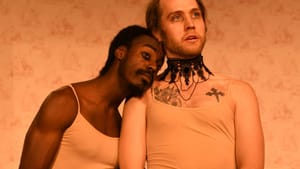Stay in the Loop
BSR publishes on a weekly schedule, with an email newsletter every Wednesday and Thursday morning. There’s no paywall, and subscribing is always free.
Chekhov at the end of the world
EgoPo Classic Theater presents Reza de Wet’s ‘Three Sisters Two’

Three Sisters Two, the latest offering in EgoPo Classic Theater’s season of South African drama, reimagines Chekhov’s ennui-sodden heroines from a postcolonial point of view. Without changing the setting or the core characteristics of the Prozorov sisters, playwright Reza de Wet uses the classic work of Western theater to consider questions of class and gender in contemporary South Africa.
Director Brenna Geffers’s visually stunning production, with hauntingly desolate sets and lighting by Thom Weaver, moves these questions even further. The use of genderfluid casting, like the play itself, impregnates a classic with new meaning.
A future free of fantasy
The play begins as its progenitor ends, with Olga (Jahzeer Terrell), Masha (Andrew J. Carroll), and Irina (Lee Minora) wrapped in a tight embrace. “We will live,” they tell themselves, as they stand on the brink of an uncertain future. But how?
The answer doesn’t conform to a fantasy of better days ahead. Set twenty years after Chekhov put down his pen, in the waning days of the Russian Revolution, de Wet’s scenario finds the Prozorovs neck-deep in the same wading pool of misery — just under different circumstances. The Bolsheviks strip Olga of her teaching position. Masha makes it to Moscow, where she lives as a general’s mistress. Irina’s bright-eyed, fluttery disposition remains, but her famous optimism has hardened.
The cramped apartment they share also includes brother Andrey (Amanda Schoonover) and his arriviste wife Natasha (a rippingly funny Maria Konstantinidis), who conveniently reinvents herself as a party loyalist. Their daughter Sofya (Kishia Nixon, enchanting) recalls Irina in her springier days, her youthful buoyancy made all the more poignant by the play’s grim frame. A nurse in a military hospital, she seems the only family member who fails to fully grasp the dire state of her country.
The end of the known world
Divorced from its South African context, Three Sisters Two would stand as a worthy sequel that advances the themes of its source material. Chekhov’s characters often interrogate their purpose and whether their lives hold meaning, and those questions only grow more poignant with age.

Yet de Wet, who wrote in Afrikaans, understood how her conceptualization would resonate, even without explicit changes to the setting or the period. At all points, the Prozorovs exist at the end of the known world — the turn of the twentieth century, the eve of a revolution. The same could be said for South Africa in 1999, when the play premiered. (De Wet died in 2012, at age 49.) That sense of uncertainty permeates every action executed by these characters, and so does the understanding that even good change will bring about some uncomfortable revelations. The old order must end for the new world to begin.
The relics of that old order don’t fare particularly well in de Wet’s treatment. Schoonover — unrecognizable in Natalia de la Torre’s baggy costumes and heavy makeup — imbues Andrey with a sense of sad-sack desperation, a golden boy who aged into a thoroughly ordinary man. Colleen Corcoran’s quietly mournful Vershinin offers the portrait of a soldier whose army left him behind. Ross Beschler’s preening playwright Igor uses bravado to mask his fears of destitution, censorship, and arrest.
Standout sisters
Terrell, Carroll, and Minora could easily stand up to any grouping of these women — though Carroll especially locates the calcified bitterness lurking beneath Masha’s plumed surface. In total, they offer some of the richest representations of these characters I’ve ever seen. The fact that it’s not really Chekhov hardly matters. De Wet, along with Geffers and her company, captures his essence entirely.
By sheer coincidence, three local companies will present differing versions of Three Sisters, giving Philadelphia theatergoers the chance to examine the Prozorovs from many different angles. Like a shot from Chekhov’s gun, Three Sisters Two kicks off this mini-festival with a bang.
What, When, Where
Three Sisters Two. By Reza de Wet, Brenna Geffers directed. EgoPo Classic Theater. Through February 17, 2019, at the Latvian Society Theater, 531 N. 7th Street, Philadelphia. (267) 273-1414 or egopo.org.
Sign up for our newsletter
All of the week's new articles, all in one place. Sign up for the free weekly BSR newsletters, and don't miss a conversation.
 Cameron Kelsall
Cameron Kelsall